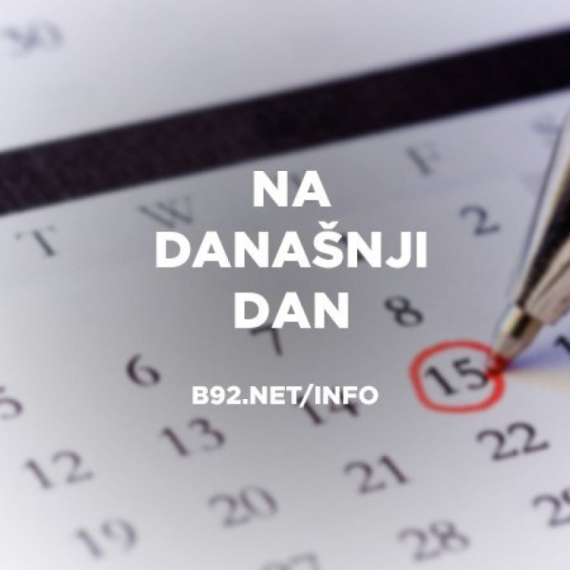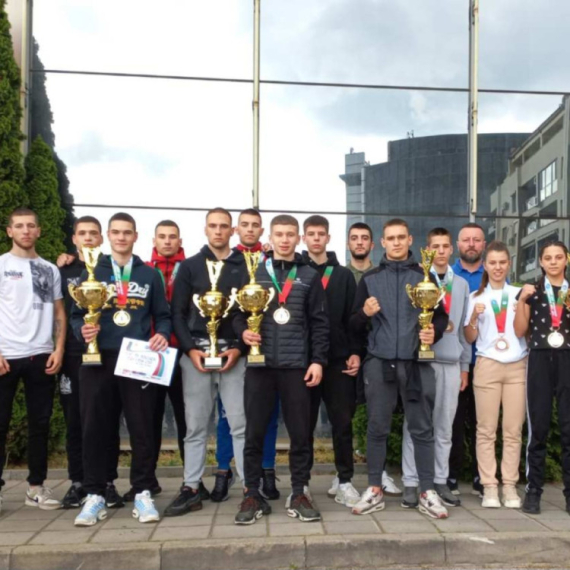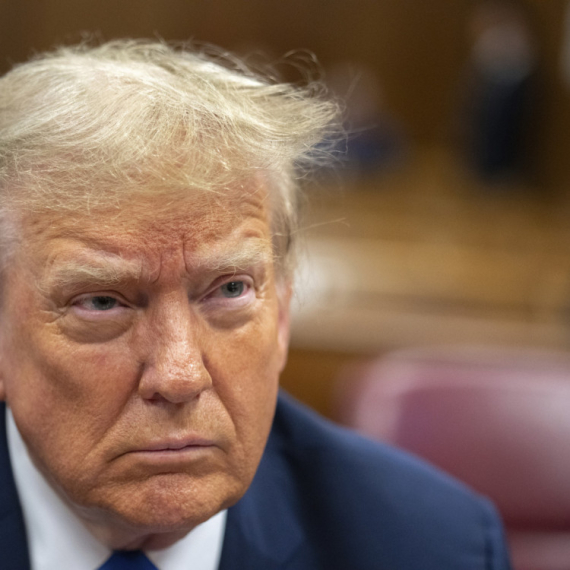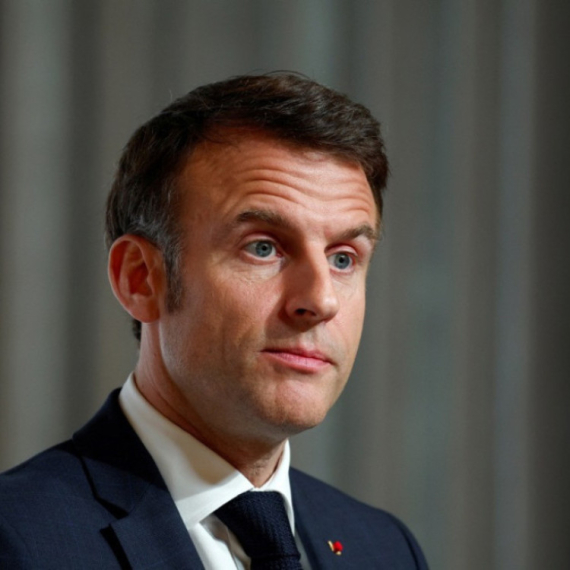NATO issue tests ruling coalition?
Tensions have been growing Monday within Serbia's ruling coalition over the issue of the country's ties with NATO.
Monday, 03.09.2007.
10:36

Tensions have been growing Monday within Serbia's ruling coalition over the issue of the country's ties with NATO. President Boris Tadic issued a statement today calling on all parties in Serbia, "those forming the government and those in opposition", to put the interest of the state first, the presidential press service said. NATO issue tests ruling coalition? "At this time, our state negotiating team is engaged in very difficult and delicate talks over the future status of Kosovo, based on a unified state platform, confirmed by the Serbian Parliament." "Therefore I call on all the parties to show restraint and spirit worthy of the state, that will not burden or weaken Serbia's position in the negotiations." So far, the statement said, Serbia pursued a unified and well-thought through common strategy. "Therefore I warn political parties that it is extremely harmful to, at this point, put forward defeatist proposals to make decisions that prejudice a negative outcome, and to leave party promotion politics for another time," the president concluded. Earlier Monday, Prime Minister Vojislav Kostunica’s Democratic Party of Serbia (DSS) called for a postponement of both presidential and local elections until after the settlement of the Kosovo issue. The party demanded such action be taken even though Constitutional Law says the elections have to be called by the end of the year. DSS representatives have continued to push for a parliamentary debate on Serbia’s NATO membership and a possible decision that Serbia cannot join the North-Atlantic Alliance. Meanwhile, Foreign Minister Vuk Jeremic, from Tadic’s Democratic Party (DS), who is expected to sign Serbia’s accession document for the Partnership for Peace program on Wednesday, says that Serbia should maintain good relations with NATO precisely for the sake of Kosovo. Nonetheless, their coalition partners from the DSS suggested that, should Kosovo Albanians unilaterally proclaim independence with U.S. backing, parliament should declare such a decision null and void and adopt a decree ruling out Serbian membership of NATO. “We believe we cannot allow ourselves to be taken by surprise by something that might happen in December." "We also want to be able to undertake some sort of preventive action against the U.S. and NATO states that venture into recognizing Kosovo independence,” DSS spokesman Branislav Ristivojevic said. He went on to say his party would launch a discussion over these suggestions with cabinet partners and open a debate with other political factors and the public as well. “What the prime minister said in the program he presented to the parliament, prior to the new government being sworn in, and 133 lawmakers backed with their votes, pertained to European integration, while there was no mention of Atlantic integration." "As this was not put at the heart of the political agreement, the agreement as such cannot be revoked because of it,” Ristivojevic said, apparently addressing speculation that the DS-DSS rift was growing along the relationship with NATO line. Jeremic, however, stressed that if Serbia wanted to score a diplomatic victory over the future status of Kosovo, what it needs is the support of key international factors. “The support of NATO member states is absolutely vital if we want to see the Kosovo issue settled in a matter which will not violate our territorial integrity and sovereignty." "I believe it is in Serbia’s direct interests to maintain good diplomatic relations with those whose votes carry most clout in the status settlement process,” the foreign minister said. On Saturday, Tadic announced he was ready to run for the second term, and said that his party will never give up on European integration, and that those who wanted new isolation and conflicts with the European Union and NATO were working on impoverishing Serbian citizens. The Democrats have been for the most part quiet as during August, virtually every cabinet minister on the DSS ticket issued statements severely critical of NATO and its role in the process of settling Kosovo's status. Another one of the so-called democratic bloc cabinet partners, G17 Plus, objected to the anti-NATO rhetoric Monday by saying that Serbian citizens should decide by voting in a referendum on whether or not the country should join the North-Atlantic Alliance. Meanwhile, the prime minister's party found backing with the opposition, namely the Radicals (SRS) and Socialists (SPS), who used the opportunity to reiterate that they were against Serbia "ever joining NATO". SRS Secretary Genral Aleksandar Vucic said that Serbia’s place was "nowhere near the organization". “We are talking about an organization that bombed our country. NATO only aggravated Serbia’s economic problems. We see no reason to become a member,” he said. SPS leader Ivica Dacic remarked that Serbia ought to draw up a clear list of measures to be undertaken, should unilateral recognition of Kosovo’ independence take place. “It is important to know in advance what we are going to do in that case, and not discuss the issue on December 10 or 11,” Dacic said. Kostunica, Tadic: A growing rift? (FoNet, archive)
NATO issue tests ruling coalition?
"At this time, our state negotiating team is engaged in very difficult and delicate talks over the future status of Kosovo, based on a unified state platform, confirmed by the Serbian Parliament.""Therefore I call on all the parties to show restraint and spirit worthy of the state, that will not burden or weaken Serbia's position in the negotiations."
So far, the statement said, Serbia pursued a unified and well-thought through common strategy.
"Therefore I warn political parties that it is extremely harmful to, at this point, put forward defeatist proposals to make decisions that prejudice a negative outcome, and to leave party promotion politics for another time," the president concluded.
Earlier Monday, Prime Minister Vojislav Koštunica’s Democratic Party of Serbia (DSS) called for a postponement of both presidential and local elections until after the settlement of the Kosovo issue.
The party demanded such action be taken even though Constitutional Law says the elections have to be called by the end of the year.
DSS representatives have continued to push for a parliamentary debate on Serbia’s NATO membership and a possible decision that Serbia cannot join the North-Atlantic Alliance.
Meanwhile, Foreign Minister Vuk Jeremić, from Tadić’s Democratic Party (DS), who is expected to sign Serbia’s accession document for the Partnership for Peace program on Wednesday, says that Serbia should maintain good relations with NATO precisely for the sake of Kosovo.
Nonetheless, their coalition partners from the DSS suggested that, should Kosovo Albanians unilaterally proclaim independence with U.S. backing, parliament should declare such a decision null and void and adopt a decree ruling out Serbian membership of NATO.
“We believe we cannot allow ourselves to be taken by surprise by something that might happen in December."
"We also want to be able to undertake some sort of preventive action against the U.S. and NATO states that venture into recognizing Kosovo independence,” DSS spokesman Branislav Ristivojević said.
He went on to say his party would launch a discussion over these suggestions with cabinet partners and open a debate with other political factors and the public as well.
“What the prime minister said in the program he presented to the parliament, prior to the new government being sworn in, and 133 lawmakers backed with their votes, pertained to European integration, while there was no mention of Atlantic integration."
"As this was not put at the heart of the political agreement, the agreement as such cannot be revoked because of it,” Ristivojević said, apparently addressing speculation that the DS-DSS rift was growing along the relationship with NATO line.
Jeremić, however, stressed that if Serbia wanted to score a diplomatic victory over the future status of Kosovo, what it needs is the support of key international factors.
“The support of NATO member states is absolutely vital if we want to see the Kosovo issue settled in a matter which will not violate our territorial integrity and sovereignty."
"I believe it is in Serbia’s direct interests to maintain good diplomatic relations with those whose votes carry most clout in the status settlement process,” the foreign minister said.
On Saturday, Tadić announced he was ready to run for the second term, and said that his party will never give up on European integration, and that those who wanted new isolation and conflicts with the European Union and NATO were working on impoverishing Serbian citizens.
The Democrats have been for the most part quiet as during August, virtually every cabinet minister on the DSS ticket issued statements severely critical of NATO and its role in the process of settling Kosovo's status.
Another one of the so-called democratic bloc cabinet partners, G17 Plus, objected to the anti-NATO rhetoric Monday by saying that Serbian citizens should decide by voting in a referendum on whether or not the country should join the North-Atlantic Alliance.
Meanwhile, the prime minister's party found backing with the opposition, namely the Radicals (SRS) and Socialists (SPS), who used the opportunity to reiterate that they were against Serbia "ever joining NATO".
SRS Secretary Genral Aleksandar Vučić said that Serbia’s place was "nowhere near the organization".
“We are talking about an organization that bombed our country. NATO only aggravated Serbia’s economic problems. We see no reason to become a member,” he said.
SPS leader Ivica Dačić remarked that Serbia ought to draw up a clear list of measures to be undertaken, should unilateral recognition of Kosovo’ independence take place.
“It is important to know in advance what we are going to do in that case, and not discuss the issue on December 10 or 11,” Dačić said.






































Komentari 28
Pogledaj komentare